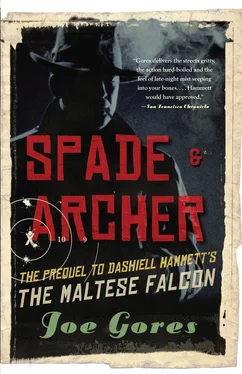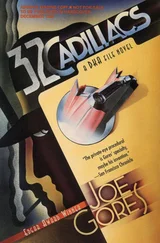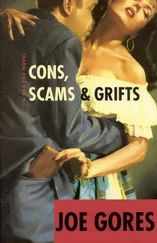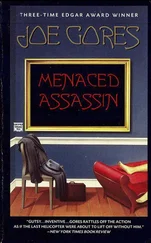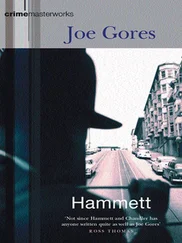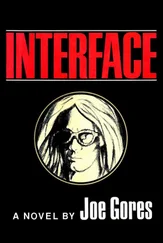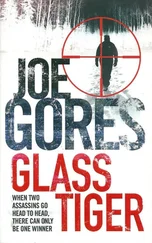“Dago red,” he said to himself.
The door to Eberhard’s outer office was not locked. Spade went past the deserted secretary’s desk to the private office. He used his light on the door, his penknife on the lock, and was in. His light swept the room. There was a conference table of modest proportions with six chairs arranged around it. The light stopped on Eberhard’s executive-style rolltop desk.
“That’ll do it,” said Spade softly.
The roll curtain was down and locked. His penknife easily jimmied the lock. He slid up the curtain, heard the locking device on the pedestal drawers down each side of the desk click open. Rifled the pigeonholes. Flicked open the private locker pigeonhole with his penknife, stuffed the contents into one pocket of his mackinaw without looking at them.
From the double-depth pedestal drawer on the right-hand side of the desk he extracted three files, folded them, and stuffed them into his other coat pocket. He shut the drawers, returned everything to its original position, closed down the roll curtain to lock the drawers.
Spade paused again at the head of the stairs and was rewarded with faint male voices singing “Ukulele Lady” quite badly.
“Dago red indeed,” he muttered again, grinning.
He slid through the narrowly opened shaft doors to the roof of the elevator, grunted his way up his rope to the cable wheels, muscled himself up to crouch on the narrow catwalk, and used his knife to worry open the knot on his rope and haul it up.
On the roof he broke a wooden match into four short pieces and shoved one piece into each of the hasp’s screw holes, used a coin to tighten down the screws in their holes. He reversed his way back over two roofs and away.
It was just after midnight when Spade left the Sutter car to walk down Hyde Street. As he angled across the intersection a big black Buick sedan roared up Post toward him. He threw himself headlong into the gutter in front of his apartment house as the driver’s heavy revolver spat fire four times. The third of the shots neatly plucked Spade’s hat off his head and sent it rolling across the sidewalk. The sedan squealed downhill into Hyde and was gone.
Spade was on his feet and snatching up his hat before the car had disappeared. He twisted his key in the vestibule door lock, jerked it out, sprinted up the stairs before any window could be raised, any head thrust out in response to the shots.
The phone was ringing when he came into his apartment. He ignored it to cross the front room in the dark, part the curtains enough to peer down at the people in the street. They were pointing in various directions, none of them toward his darkened windows. The phone stopped ringing, started again. A uniformed policeman was using his key on the police call box on the corner.
Spade let the window curtain fall back into place. He put the papers purloined from Eberhard’s desk under the pillows of the sofa, removed his hat and mackinaw, and hung them on the hooks inside the front door. Ignoring the police sirens, the squeal of police car wheels, Spade poured himself a shot of Bacardi. He sat in his easy chair in the dark and smoked cigarettes and drank.
When he returned to the window a half hour later, only a few citizens now stood around in the street below, talking and gesturing. The police had departed without ringing his doorbell.
Spade had just lowered the wall bed when the phone rang for the sixth time. He picked it up from its place on the bedside table, atop Duke’s Celebrated Criminal Cases of America.
“Spade,” he said.
Effie Perine’s voice said, “Penny is here. She’s been here for hours. She’s terrified. She needs you, Sam.”
Spade sat down on the edge of the bed. “Put her on.”
After long moments Penny’s voice came, small and hesitant.
“I saw him. On Market Street.” Her voice steadied, strengthened as she talked. “And he saw me.”
“When?”
“Around nine o’clock. I was just crossing Market when I saw him walking toward me, very fast. I–I jumped on a passing car. He tried to get on, but it was moving too fast and the doors were shut. I rode it to Sixth Avenue in the Richmond, got off, and ran out here to Effie’s place. I–I’ve been here ever since. If he should think to come here—”
“Put Effie back on,” said Spade soothingly.
“I’m here,” said Effie Perine.
“How’s your mother with all these shenanigans?”
She got closer to the phone. “She’s worried, maybe a little scared, but she’s always been strong for Penny.”
“OK, make sure all the doors and windows are locked till I get there. Call the Monroe Hotel out on Sacramento Street and reserve a room for a Mary Kutina, that’s K-u-t-i-n-a. I don’t think he’d try to crush his way in there, but if you see anyone hanging around call the cops and report a Peeping Tom.”
Spade hung up, got central, gave the operator Davenport 1000. A man’s gruff voice answered. “Bluebird Cabs.”
“Eight nine one Post Street, ten minutes,” said Spade.
He started out of the apartment, grabbing his hat and the mackinaw. He stopped, wiggled his fingers through the entry and exit holes in his hat, tossed it aside, and got another. It was tan and did not go with the rest of his clothes.
The Monroe Hotel was between Van Ness and Franklin at the lower edge of Pacific Heights. Spade had money in hand for the cabdriver. He hurried into the hotel so fast, with Penny in tow, that she was on the sidewalk a bare five seconds.
The clerk was a slightly bug-eyed man with an old-fashioned monocle on a velvet cord that passed through the lapel buttonhole of his three-piece suit. He had a judging face, a tightly trimmed sandy mustache, slim fingers that drummed nervously on the desktop.
“May we help you, sir?” His voice was supercilious.
Spade spun the hotel register around, wrote “Mary Kutina, City,” in a bold slashing hand, saying without looking up, “My secretary phoned ahead for a reservation for Miss Kutina.”
The clerk’s eyes took in Spade’s disreputable appearance, Penny’s frightened eyes and cloche hanging precariously to the side of her head, the cheap frock under a calf-length coat that had seen better days. The eyes slid to the lobby clock.
“I think not, sir.” His voice just avoided having a sneer in it. “We are not that kind of hotel.”
“You are now,” said Spade. “Tell your house dick, Skip LeGrande, that Sam is stashing a witness for a day or two.” He tossed money on the counter, reached across to the keyboard and snagged a key, held it up, said, “Three three three.”
Spade put their hats on the shelf of the closet inside the door, hung up their coats. When he turned, Penny was standing in the middle of the room with a dazed look on her face, as if she couldn’t remember where she was or how she had gotten there.
“Sit down, precious,” Spade said.
She sat down obediently in the closest chair in that same all-at-once-boneless way with which she had sat when Spade had braced her the night before. Her face was pale, exhaustion rimmed her eyes with red and made their lids seem transparent.
Spade half-filled two glasses with water from the sink, set them down on the table beside Penny’s chair, poured generous doses of dark liquid into each glass from a curved, leather-covered metal flask off his hip. He kept one glass for himself, put the other into her hand. He clinked his glass to hers.
“Success to crime,” he said.
She shuddered. “Can’t we drink to something else?”
“To truth,” said Spade. This time she drank, greedily, as she had drunk the at-first-refused coffee at her apartment.
“I’m just so tired of running and hiding and lying all the time,” she said. “Of being so scared for so long I can’t remember what it’s like to not be scared.”
Читать дальше
